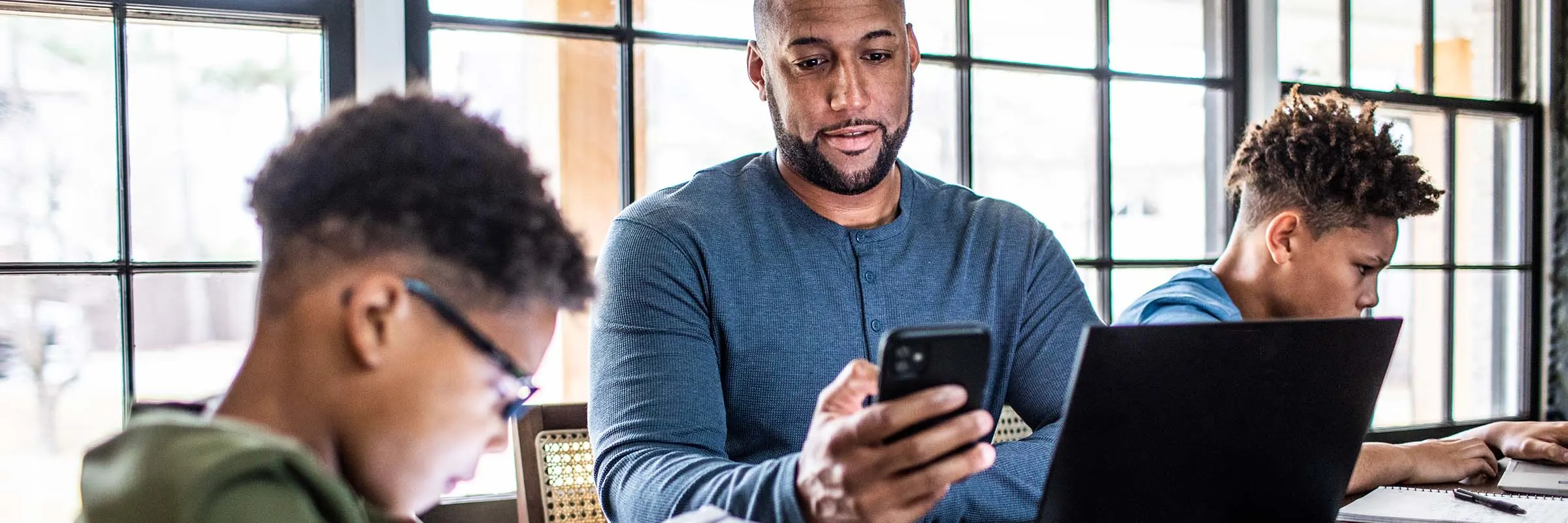What we'll cover
How to protect yourself from data breaches
Public Wi-Fi safety tips
Security best practices
Whether it's for work, school or banking, we spend a lot of our lives online, which can at times include sharing personal, valuable information. But do you know how secure your data actually is? Last year, 425 million people were affected by data breaches and leaks. Meanwhile, 9 in 10 Americans are understandably concerned about being hacked.
Don't worry, there are simple steps you can take to help protect your data. And Ally is here to help you keep your financial information secure. Together, these combined efforts can help bring you peace of mind.
Secure your home network
More people work remotely than ever before, making at-home networks, work technologies and smart home devices even bigger targets for hackers than in the past. Only work remotely from a secure Wi-Fi network. Make sure your equipment is up to date and regularly change your Wi-Fi password to help ensure you keep cybercriminals off your network.
Keep tabs on connected devices
Smart technology like AI assistants and video doorbells can make life easier, but they can also be a cybercriminal's key into your house unless you've set up a secure wireless network. To stay extra secure, consider keeping certain connected devices turned off when not in use.
Be aware of public Wi-Fi
Public networks are easy targets for hackers, making them a particularly dangerous place to manage your banking and finances. Make financial transactions, like banking and shopping, on a trusted network with your own device that's protected by security software. When possible, use your phone's data plan for mobile banking and other secure transactions.
Fortify your passwords
We take great care to keep your finances secure within our systems. You can help keep yourself protected by creating secure, strong passwords for online banking, as well as your other accounts.
Start with these three best practices:
Aim for at least 10 to 12 characters, but 16 to 18 or even 20 is even better
Avoid common names, places and dictionary words
Use a random mixture of uppercase and lowercase letters along with numbers and symbols
Watch what you share
Think twice about geotagging social posts. Your friends might love to see you eating pasta Bolognese in Bologna, but criminals can use that information for malicious purposes, like targeting your home when away, or in the world of generative AI, even use your photos to create deep fakes. And check your privacy settings to ensure you're only sharing posts with your followers instead of the entire digital world.
Know the signs of a scam
Take precautions so you don't walk right into fraudster's traps. Know the signs of common attacks like phishing and smishing, and trust your gut. If something feels off, it probably is.
Stay aware
The web isn't the only place criminals can capture your personal information. When talking on the phone, take note of your surroundings so you don't accidentally share sensitive credentials and numbers. And if you like to shop online on the go, watch out for shoulder surfers who could grab your financial information while you're grabbing that can't-miss deal.
Always try to make financial transactions, like banking and shopping, on a trusted network with your own device that's protected by security software.
If you're hacked, act quickly
Data breaches happen. If you suspect your financial information has been compromised, time is of the essence. Contact your bank immediately. They can freeze your account and minimize the impact.
Stay alert, stay safe
Although data breaches, scams and fraud are certain to continue, we're committed to being an ally for your privacy and security. Playing an active role in your own protection, combined with following security best practices, can help you feel safe and secure.



